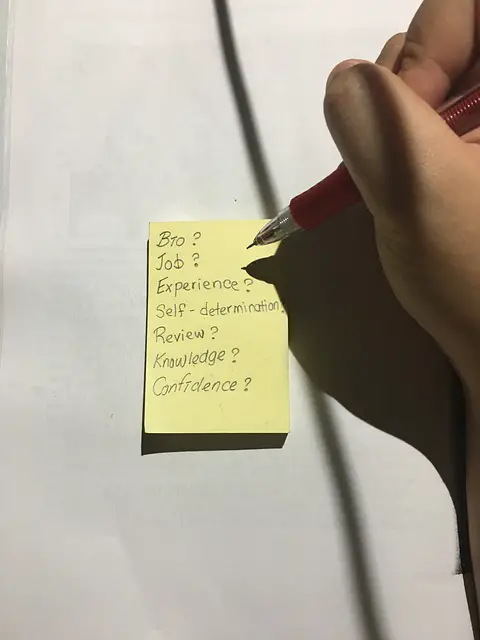Are you curious to know how long to prepare for an interview? In general it takes 10 to 12 hours to prepare for interview. The time required to prepare for a job interview can vary depending on several factors, such as the complexity of the position, your level of experience, and the amount of research needed.
Preparing for a job interview can make the difference between success and disappointment. It’s crucial to invest time and effort into interview preparation to showcase your skills and stand out from the competition. This article aims to guide you on how long it takes to adequately prepare for an interview and the essential steps involved in the preparation process.
Table of Contents
Understanding the Importance of Interview Preparation
The significance of interview preparation
Interview preparation is more than just a formality; it’s an opportunity to demonstrate your professionalism, knowledge, and enthusiasm for the position. By thoroughly preparing, you can effectively communicate your qualifications and leave a lasting impression on the interviewer.
Impact on Confidence and Performance
Preparation boosts your confidence, reduces anxiety, and allows you to articulate your thoughts clearly during the interview. The more prepared you are, the more likely you are to perform well and effectively answer questions.
The role of preparation in demonstrating interest and commitment
Investing time in interview preparation shows your dedication and genuine interest in the role and the company. It conveys to the interviewer that you value the opportunity and are committed to succeeding if hired.
Factors Affecting the Preparation Time
Experience and familiarity with the industry
Your level of experience in the industry can affect the amount of time needed for preparation. If you are familiar with the industry and have relevant experience, you may require less time to refresh your knowledge and skills.
The complexity of the job position
The complexity of the job position plays a role in determining the preparation time. Highly specialized or technical roles may require more in-depth preparation to showcase your expertise effectively.
Time availability and urgency of the interview
The time available before the interview and the urgency of the position influence the preparation duration. If you have limited time, you may need to focus on key areas and prioritize your preparation efforts accordingly.
Assessing Your Skills and Knowledge
Identifying relevant skills and Qualifications
Before diving into interview preparation, evaluate the skills and qualifications required for the job. Identify the key competencies sought by the employer and assess how your skills align with those requirements.
Conducting a self-assessment
Conduct a thorough self-assessment to identify your strengths, weaknesses, and areas for improvement. This evaluation will help you tailor your preparation to emphasize your strengths and address any skill gaps.
Addressing skill gaps through learning and Practice
If you identify any skill gaps, invest time in learning and practice to bridge those gaps. Take online courses, read relevant materials, or seek guidance from professionals in the field to enhance your knowledge and abilities.
Researching the Company and Position
Importance of company research
Demonstrating knowledge about the company and the position shows your genuine interest and dedication. Research the company’s mission, values, recent achievements, and any industry trends that may impact the organization.
Understanding the job requirements
Thoroughly review the job description and understand the specific requirements of the position. This will enable you to align your skills and experiences with the needs of the employer and prepare relevant examples and stories to share during the interview.
Tailoring your preparation to align with company values and goals
During your preparation, ensure that your responses and examples align with the company’s values and goals. This demonstrates that you are a good fit for the organizational culture and can contribute to its success.
Preparing Common Interview Questions
Types of common interview questions
Familiarize yourself with common interview questions, including behavioral, situational, and competency-based questions. Practice formulating concise and compelling answers that highlight your skills and experiences.
Developing thoughtful and concise answers
Craft answers that showcase your achievements, problem-solving abilities, and relevant experiences. Focus on providing specific examples and results to support your answers.
Practicing Responses to showcase your strengths
Practice delivering your answers with confidence and clarity. Consider conducting mock interviews with a friend or mentor to simulate real interview scenarios and receive constructive feedback.
Practicing Mock Interviews

Benefits of mock interviews
Mock interviews provide a valuable opportunity to refine your interview skills and gain confidence. They help you become comfortable with the interview process, improve your communication style, and identify areas for improvement.
Seeking feedback and improvement areas
Request feedback from your mock interviewers on areas where you can enhance your responses, body language, and overall performance. Use their insights to refine your answers and improve your interview technique.
Simulating realistic interview scenarios
Recreate realistic interview scenarios during mock interviews. Dress professionally, maintain proper eye contact, and practice active listening. This will help you adapt to the interview environment and perform better during the actual interview.
Enhancing Communication and Body Language
Importance of effective communication:
Effective communication is crucial in making a positive impression during an interview. Focus on speaking clearly, using appropriate language, and demonstrating active listening skills.
Strategies to improve verbal and non-verbal Communication:
Pay attention to your tone of voice, pace of speech, and body language. Practice maintaining a confident and friendly demeanor, using appropriate gestures, and maintaining good posture throughout the interview.
Projecting Confidence through body language:
Confident body language can reinforce your qualifications and make a lasting impression. Stand tall, make eye contact, and avoid fidgeting or slouching. Use open and engaged body language to convey your interest and enthusiasm.
Polishing Your Resume and Cover Letter
- Tailoring your resume to highlight relevant experience: Review your resume and tailor it to emphasize the skills and experiences most relevant to the job you’re interviewing for. Highlight accomplishments, quantify results where possible, and ensure a clear and organized format.
- Proofreading and formatting guidelines: Thoroughly proofread your resume and cover letter for any errors or typos. Pay attention to formatting, font consistency, and overall readability. Consider seeking feedback from a trusted friend or mentor to ensure clarity and professionalism.
- Crafting a compelling cover letter: Write a personalized cover letter that showcases your enthusiasm for the position and your understanding of the company. Highlight specific qualifications and experiences that make you a strong candidate. Keep it concise, engaging, and tailored to the job requirements.
Utilizing Online Resources and Tools

- Online Platforms for interview preparation: Take advantage of online platforms that offer interview preparation resources, such as sample questions, interview tips, and interactive practice sessions. These platforms can provide valuable guidance and help you familiarize yourself with different interview formats.
- Accessing sample interview questions and answers: Seek out sample interview questions relevant to your industry or job position. Practice formulating concise and compelling answers that align with your experiences and qualifications.
- Utilizing video tutorials and online courses: Explore video tutorials and online courses focused on interview preparation. These resources can provide valuable insights into interview techniques, body language, and effective communication skills.
Seeking Professional Guidance
- Benefits of career coaching or Mentorship: Consider seeking professional guidance from a career coach or mentor who can provide personalized advice and help you navigate the interview process. They can offer valuable insights, conduct mock interviews, and assist in honing your interview skills.
- Engaging in mock interviews with professionals: Arrange mock interviews with professionals in your field or industry. Their expertise and feedback can offer valuable perspectives and help you refine your interview responses and overall performance.
- Obtaining Feedback and personalized advice: After each mock interview or guidance session request specific feedback on areas where you can improve. Seek personalized advice on how to enhance your interview technique, communication skills, and overall presentation. Incorporate the feedback into your preparation process to refine your approach.
Creating a Study Schedule
- Setting realistic study goals
Establish specific goals for your interview preparation. Break down the tasks into manageable steps and allocate time for each aspect of your preparation, such as researching, practicing responses, and conducting mock interviews.
- Allocating time for different interview preparation aspects
Determine how much time you can dedicate to interview preparation each day or week. Allocate sufficient time for researching the company, practicing interview questions, and enhancing your skills and knowledge.
- Following a structured study plan
Create a structured study plan that outlines the activities you need to accomplish each day or week. Prioritize your tasks based on their importance and allocate time accordingly. Stick to your plan to ensure comprehensive preparation.
Taking Care of Your Mental and Physical Health
Managing Stress and Anxiety
Interview preparation can be stressful, so it’s essential to manage your stress levels. Engage in activities that help you relax, such as meditation, exercise, or hobbies. Practice deep breathing exercises to alleviate anxiety.
Getting sufficient sleep and rest
Adequate rest is crucial for mental clarity and focus. Prioritize getting enough sleep the night before your interview. Avoid staying up late and ensure you are well-rested and alert on the day of your interview.
Maintaining a healthy lifestyle to stay focused and energized
Take care of your physical well-being by maintaining a healthy lifestyle. Eat nutritious meals, stay hydrated, and engage in regular physical exercise. A healthy body and mind contribute to improved concentration and overall performance.
Finalizing Preparations
Step #1. Revisiting key interview concepts
Review the key concepts you have learned throughout your preparation, such as your responses to common interview questions, your understanding of the company, and your knowledge of the job requirements. Ensure you are confident in these areas.
Step #2. Conducting a final practice session
Before the interview, conduct a final practice session. Rehearse your responses to common questions, practice your body language and communication skills, and simulate the interview environment as closely as possible.
Step #3. Organizing essential documents and attire
Gather all the necessary documents, such as copies of your resume, references, and any supporting materials. Organize them neatly in a folder or portfolio. Additionally, select appropriate attire that aligns with the company’s dress code and the position you’re applying for.
Conclusion
Preparing for an interview requires time, effort, and dedication. By following the outlined steps, including assessing your skills, researching the company, practicing mock interviews, and enhancing communication and body language, you can significantly improve your chances of success. Remember to create a study schedule, prioritize your mental and physical well-being, and finalize your preparations before the big day.
FAQs with Answers about How Long to Prepare for an Interview
Is 1 hour enough to prepare for an interview?
While one hour is better than no preparation at all, it may not be sufficient for comprehensive interview preparation. However, you can still make good use of this time by focusing on reviewing the job description, researching the company, and practicing concise responses to common interview questions.
Is 2 hours enough time to prepare for an interview?
Two hours can be a reasonable amount of time to dedicate to interview preparation, especially if you have some prior knowledge or experience related to the job. Use this time to refresh your knowledge, practice responses to common questions, and conduct a mock interview to assess your readiness.
How do I prepare for an interview in 24 hours?
Preparing for an interview in 24 hours requires efficient use of time. Here’s a suggested plan:
Research the company: Familiarize yourself with its mission, values, recent news, and any relevant industry trends.
Review the job description: Understand the specific requirements of the position and identify how your skills align.
Practice common questions: Focus on formulating concise and compelling answers that highlight your experiences and achievements.
Conduct a mock interview: Simulate a real interview scenario with a friend or mentor to gain feedback and practice your responses.
Enhance communication skills: Pay attention to your verbal and non-verbal communication, body language, and active listening.
Prepare your attire and documents: Select appropriate attire and organize essential documents, such as copies of your resume and references.
Remember, while time is limited, prioritize the most critical aspects of preparation to make the most of the available hours.

